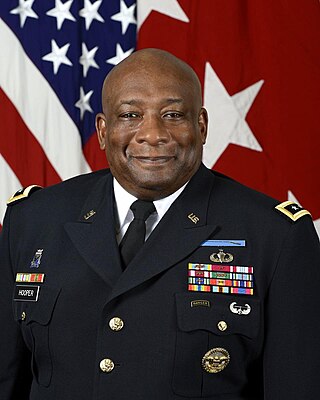Related Research Articles

The Qatar Armed Forces are the military forces of the State of Qatar. Since 2015, Qatar has implemented mandatory military conscription with an average of 2,000 graduates per year. As of 2010, Qatar's defence expenditures added up to a total of $1.913 billion, about 1.5% of the national GDP, according to the SIPRI. Qatar has recently signed defence pacts with the United States in 2002 & 2013, with the United Kingdom in 2020, and with France in 1994.
International Traffic in Arms Regulations (ITAR) is a United States regulatory regime to restrict and control the export of defense and military technologies to safeguard national security and further its foreign policy objectives.
International Military Education and Training (IMET) is the title of a United States security assistance program, a type of student exchange program.

The Defense Security Cooperation Agency (DSCA) is an agency within the United States Department of Defense (DoD) which provides financial and technical assistance, transfer of defense materiel, training and services to allies, and promotes military-to-military contacts.

The Foreign Assistance Act is a United States law governing foreign aid policy. It outlined the political and ideological principles of U.S. foreign aid, significantly overhauled and reorganized the structure of U.S. foreign assistance programs, legally distinguished military from nonmilitary aid, and created a new agency, the United States Agency for International Development (USAID) to administer nonmilitary economic assistance programs. Following its enactment by Congress on September 4, 1961, President John F. Kennedy signed the Act into law on November 3, 1961, issuing Executive Order 10973 detailing the reorganization.

The Arms Export Control Act of 1976 gives the President of the United States the authority to control the import and export of defense articles and defense services. The H.R. 13680 legislation was passed by the 94th Congressional session and enacted into law by the 38th President of the United States Gerald R. Ford on June 30, 1976.

The United States Department of Defense is an executive branch department of the federal government of the United States charged with coordinating and supervising all agencies and functions of the U.S. government directly related to national security and the United States Armed Forces. As of June 2022, the U.S. Department of Defense is the largest employer in the world, with over 1.34 million active-duty service members, including soldiers, marines, sailors, airmen, and guardians. The Department of Defense also maintains over 778,000 National Guard and reservists, and over 747,000 civilians bringing the total to over 2.87 million employees. Headquartered at the Pentagon in Arlington County, Virginia, just outside Washington, D.C., the Department of Defense's stated mission is to provide "the military forces needed to deter war and ensure our nation's security".
The United States government first recognized the usefulness of foreign aid as a tool of diplomacy in World War II. It was believed that it would promote liberal capitalist models of development in other countries and that it would enhance national security.

Military relations between Israel and the United States have been extremely close, reflecting shared security interests in the Middle East. Israel is designated as a major non-NATO ally by the U.S. government. A major purchaser and user of U.S. military equipment, Israel is also involved in the joint development of military technology and it regularly engages in joint military exercises with United States and other forces. The relationship has deepened gradually over time, though, as Alan Dowty puts it, it was "not a simple linear process of growing cooperation, but rather a series of tendentious bargaining situations with different strategic and political components in each."
United States Security Assistance Organizations (SAOs) are U.S. government military and civilian personnel stationed in foreign countries to manage security assistance and other military programs. SAOs are closest to these programs' operation and have the closest contact with host-country militaries.
The United StatesForeign Military Financing (FMF) program provides grants and loans to friendly foreign governments to fund the purchase of American weapons, defense equipment, services and training. The program was established through the 1976 Arms Export Control Act and is overseen by the Office of Security Assistance within the Bureau of Political-Military Affairs of the United States Department of State and executed by the Defense Security Cooperation Agency (DSCA) of the United States Department of Defense. The program's stated aims are to be promote U.S. interests by "ensuring coalition partners and friendly partner governments are equipped and trained to pursue common security objectives by contributing to regional and global stability, strengthening military support for democratically-elected governments, fighting the War on Terror, and containing other transnational threats including trafficking in narcotics, weapons and persons."
The Defence Production Sharing Agreement (DPSA) is a bilateral trade agreement between the United States and Canada that aims to balance the amount of military cross-border buying in order to avoid trade imbalances. Since its signing in 1956, it has led to a number of US companies sending military production to Canada in order to "offset" Canadian purchases of US military equipment. The Agreement has been amended on several occasions. The similar Defense Development Sharing Program organized sharing of military research and development.

The United States Army Security Assistance Command (USASAC) implements security assistance programs, including Foreign Military Sales (FMS) program, for the Department of the Army. USASAC is responsible for the United States Army security assistance information management and financial policy and provides logistics guidance to the army's security assistance community. The command also supports the U.S. government's emergency assistance, humanitarian aid, and military operations other than war, including peacekeeping operations by the United Nations.
Offsets are compensatory trade agreements, reciprocal trade agreements, between an exporting foreign company, or possibly a government acting as intermediary, and an importing entity. Offset agreements often involve trade in military goods and services and are alternatively called: industrial compensations, industrial cooperation, offsets, industrial and regional benefits, balances, juste retour or equilibrium, to define mechanisms more complex than counter-trade. Counter-trade can also be considered one of the many forms of defense offset, to compensate a purchasing country. The incentive for the exporter results from the conditioning of the core transaction to the acceptance of the offset obligation.
Defense Support of Civil Authorities (DSCA) is the process by which United States military assets and personnel can be used to assist in missions normally carried out by civil authorities. These missions have included: responses to natural and man-made disasters, law enforcement support, special events, and other domestic activities. A recent example of the use of DSCA is the military response to Hurricane Katrina. DSCA is the overarching guidance of how the United States military can be requested by a federal agency and the procedures that govern the actions of the military during employment.

The GBU-39/B Small Diameter Bomb (SDB) is a 250-pound (110 kg) precision-guided glide bomb that is intended to provide aircraft with the ability to carry a higher number of more accurate bombs. Most US Air Force aircraft will be able to carry a pack of four SDBs in place of a single 2,000-pound (910 kg) bomb. It first entered service in 2006. The Ground Launched Small Diameter Bomb (GLSDB) was later developed to enable the SDB to be launched from a variety of ground launchers and configurations.

The Foreign Military Sales Act of 1968, Pub. L.Tooltip Public Law 90–629, 82 Stat. 1320-2, enacted October 22, 1968, was supplemental legislation to the Arms Control and Disarmament Act of 1961 and the Foreign Assistance Act of 1961. The Act discloses the United States commitment and sustainment to a world free from the dangers of armaments and the scourge of war.

The Foreign Military Sales Act of 1971, Pub. L.Tooltip Public Law 91–672, 84 Stat. 2053, enacted January 12, 1971, was created as an amendment to the Foreign Military Sales Act of 1968. The Act of 1971 established declarations to promote international peace and national security for economic, political, and social progress. The declaration provided coordination for international armament appropriations meeting the objectives of the Nixon Administration's foreign policy.

Charles Wayne Hooper is a retired lieutenant general in the United States Army who held the position of director of the Defense Security Cooperation Agency (DSCA) from 2017 to 2020. DSCA administers security cooperation programs that support U.S. policy interests and objectives identified by the White House, Department of Defense, and Department of State. These objectives include developing specific partner capabilities, building alliances and partnerships, and facilitating U.S. access. DSCA integrates security cooperation activities in support of a whole-of-government approach; provides execution guidance to DoD entities that implement security cooperation programs; exercises financial and program management for the Foreign Military Sales system and many other security cooperation programs; and educates and provides for the long-term development of the security cooperation workforces.
References
- 1 2 Twardowski, Adam (2019-06-11). "Advancing U.S. interests through security cooperation". Brookings Institution . Retrieved 2021-02-15.
- 1 2 3 Mehta, Aaron (2020-12-04). "America sold $175 billion in weapons abroad in FY20". Defense News. Retrieved 2022-08-08.
- ↑ Theohary, Catherine A. (21 December 2015). "Conventional Arms Transfers to Developing Nations, 2007-2014". Congressional Research Service. p. 16. Retrieved 24 May 2024.
- 1 2 3 4 Lucas, Nathan J.; Vassalotti, Michael J. (21 February 2020). "Transfer of Defense Articles: Foreign Military Sales (FMS)". Congressional Research Service. p. 2. Retrieved 24 May 2024.
- ↑ "Foreign Military Sales (FMS) | Defense Security Cooperation Agency". www.dsca.mil. Retrieved 2022-08-08.
- 1 2 Agmon, Marcy; Bonomo, James; Kennedy, Michael; Leed, Maren; Watman, Ken; Webb, Katharine; Wolf, Charles (1996). Arms Proliferation Policy: Support to the Presidential Advisory Board. RAND Corporation. pp. 29–30. doi:10.7249/mr771. ISBN 978-0-8330-2403-9.
- ↑ "U.S. Arms Sales and Defense Trade". U.S. Department of State. 20 January 2021. Retrieved 24 May 2024.
- ↑ "Fiscal Year 2023 U.S. Arms Transfers and Defense Trade". U.S. Department of State. 2024-01-29. Retrieved 2024-02-05.
- 1 2 3 4 5 6 7 8 Foreign Customer Guide (PDF). Defense Security Cooperation Agency. 15 July 2018. p. 20.
- ↑ "C5 - Foreign Military Sales Case Development". Security Assistance Management Manual. Defense Security Cooperation Agency. p. 21.
- ↑ "Case Identifier | Defense Security Cooperation Agency". samm.dsca.mil. Retrieved 2024-05-24.
- ↑ "U.S. Military Code Names". designation-systems.net. Retrieved 25 March 2015.
- ↑ "Defense Transportation System (DTS) | Defense Security Cooperation Agency". samm.dsca.mil. Retrieved 2024-05-24.
- ↑ Kerr, Paul K. (4 January 2024). "Arms Sales: Congressional Review Process". Congressional Research Service. p. 2. Retrieved 24 May 2024.
- ↑ Pompeo, Michael R. (24 May 2019). "Emergency Notification of Arms Sales to Jordan, the United Arab Emirates, and Saudi Arabia". U.S. Department of State. Retrieved 24 May 2024.
- ↑ "UNITED ARAB EMIRATES (UAE) – JAVELIN GUIDED MISSILES". Defense Security Cooperation Agency. 24 May 2019. Retrieved 24 May 2024.
- ↑ "UNITED ARAB EMIRATES (UAE) – RQ-21A BLACKJACK UNMANNED AIR VEHICLES". Defense Security Cooperation Agency. 24 May 2019. Retrieved 24 May 2024.
- ↑ "UNITED ARAB EMIRATES (UAE) – ADVANCED PRECISION KILL WEAPON SYSTEM (APKWS)". Defense Security Cooperation Agency. 24 May 2019. Retrieved 24 May 2024.
- ↑ Shear, Michael D.; Edmondson, Catie (24 July 2019). "Trump Vetoes Bipartisan Resolutions Blocking Arms Sales to Gulf Nations". The New York Times . Retrieved 24 May 2024.
- ↑ Demirjian, Karoun; Itkowitz, Colby (24 July 2019). "Trump vetoes Congress's attempt to block arms sales to Saudi Arabia". The Washington Post . Retrieved 24 May 2024.
- ↑ Catie, Edmondson (29 July 2019). "Senate Fails to Override Trump's Veto on Saudi Arms Sales". The New York Times. Retrieved 24 May 2024.
- ↑ "UKRAINE – NON-STANDARD AMMUNITION". Defense Security Cooperation Agency. 25 April 2022. Retrieved 24 May 2024.
- ↑ "ISRAEL – M830A1 120MM TANK CARTRIDGES". Defense Security and Cooperation Agency. 9 December 2023. Retrieved 24 May 2024.
- ↑ "ISRAEL – 155MM ARTILLERY AMMUNITION". Defense Security Cooperation Agency. 29 December 2023. Retrieved 24 May 2024.